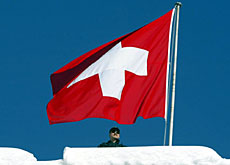Internal security threat growing, cabinet says

Public figures and authorities faced more threats to their safety in 2007, a report into internal security in Switzerland has found.
The cabinet on Tuesday expressed its concern at the preliminary findings contained in the interim study. It said terrorism and organised crime represented the biggest risks.
“The intelligence available to judge the situation and make decisions and also to recognise hidden dangers in time is no longer sufficient and does not meet the European standard,” the cabinet said in presenting the report.
The study looks at any phenomena that could affect internal security in Switzerland: terrorism, violent extremism, threats against public officials and property, cybercrime and serious disruptions at sporting events.
Compared with previous years, there was little change in the amount of proliferation and illegal sale of arms and transfer of technologies in 2007. Organised crime and violence at sports events had also remained more or less level.
Islamic threat
The government report picked out terrorism and certain forms of organised crime as the main threat to Switzerland’s internal security.
Islamic extremist groups that are based in Switzerland are focused on building up propaganda, logistics and financing of activities from their countries of origin, but are a growing potential for violence, it said.
“There are no proofs at the moment for concrete preparations for an attack inside Switzerland. But of course Switzerland is part of the western world, which is potentially at risk,” federal police spokesman Hans Ulrich Bühler told swissinfo.
Organised crime concerns such things as smuggling drugs, people and weapons, Bühler explained.
“We have preventative and repressive measures at both federal and cantonal level… The intelligence services follow the situation very closely.”
The government is to ask parliament for permission to use new ways to fight crime. “This will of course also have financial consequences,” Bühler said.
Extremist attacks
More visible to the general public, Swiss left- and rightwing political extremists represent a local and ongoing threat to security, largely targeting politicians and security officials.
Major disturbances took place at events that were loaded with symbolism, such as May 1 and August 1, the report found.
Earlier this month Justice Minister Eveline Widmer-Schlumpf withdrew from Zurich’s traditional Sechseläuten festival after the organisation which invited her received “serious threats” regarding her safety.
In August last year, the annual National Day celebration on the historical Rütli meadow attended by then president, Micheline Calmy-Rey, was marred by the discovery of an explosive device. No government ministers will be giving speeches at the event this year.
More confrontation
In another example, parliamentarian Lucrezia Meier-Schatz had to be placed under escort after the publication of a report by a commission which she chaired, critical of then Justice Minister Christoph Blocher.
Threats to public officials come from both left- and rightwing extremists, political scientist Georg Lutz told swissinfo.
“I think we are seeing changes in Swiss politics. Consensus democracy has been very important for so many years and now the style in politics among the elite has become more confrontational, and this mobilises emotions and tensions which can lead to situations where political figures are under threat.
“Sad as it is, most Western democracies and most other countries have to take substantial security measures to protect key politicians in the country. Switzerland is becoming more and more like any other democracy, which includes the need for key political figures to be protected,” he explained.
A fuller report on the issue will be published in the summer.
swissinfo
The Swiss constitution stipulates that the government and cantons ensure as far as possible the security of the country and protection of its people. The concept of internal security evolves in relation to the different threats facing the state.
Switzerland’s internal security falls under the responsibility of the justice ministry. As part of its goals for 2008, the justice ministry intends to step up security and intensify the fight against crime.
Up to 15,000 armed services personnel will be deployed to help manage Euro 2008, being hosted in four Swiss cities in June, and prevent disorder. Work is also underway for Switzerland to conform to the Council of Europe’s Convention on Cybercrime.

In compliance with the JTI standards
More: SWI swissinfo.ch certified by the Journalism Trust Initiative












You can find an overview of ongoing debates with our journalists here . Please join us!
If you want to start a conversation about a topic raised in this article or want to report factual errors, email us at english@swissinfo.ch.